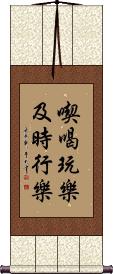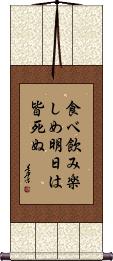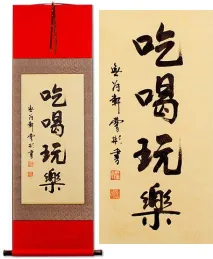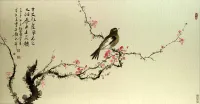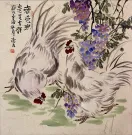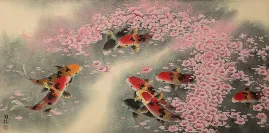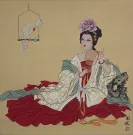Many custom options...
And formats...

Not what you want?
Try other similar-meaning words, fewer words, or just one word.
Eat and Drink in Chinese / Japanese...
Buy an Eat and Drink calligraphy wall scroll here!
Personalize your custom “Eat and Drink” project by clicking the button next to your favorite “Eat and Drink” title below...
Eat Drink and Be Merry
喫喝玩樂及時行樂 is just about the closest proverb to match the western idea of “Eat, drink, and be merry.”
This is a Chinese proverb that more literally means “Eat, drink, play, be merry, enjoy everything as long as you can.”
It's basically a suggestion that you try to enjoy everything in life, as long as you live, or as long as you are able.
Eat Drink and Be Merry
Eat Drink and Be Merry, For Tomorrow We Die
Live Well
This in-stock artwork might be what you are looking for, and ships right away...
Gallery Price: $176.00
Your Price: $97.77
Gallery Price: $61.00
Your Price: $33.88
Gallery Price: $61.00
Your Price: $33.88
Gallery Price: $61.00
Your Price: $33.88
Gallery Price: $61.00
Your Price: $33.88
Gallery Price: $61.00
Your Price: $33.88
Gallery Price: $322.00
Your Price: $178.88
Not the results for eat and drink that you were looking for?
Below are some entries from our dictionary that may match your eat and drink search...
| Characters If shown, 2nd row is Simp. Chinese |
Pronunciation Romanization |
Simple Dictionary Definition |
吃喝玩樂 吃喝玩乐 see styles |
chī hē wán lè chi1 he1 wan2 le4 ch`ih ho wan le chih ho wan le |
More info & calligraphy: Eat Drink and Be Merry |
吃香喝辣 see styles |
chī xiāng hē là chi1 xiang1 he1 la4 ch`ih hsiang ho la chih hsiang ho la |
More info & calligraphy: Live Well |
戒 see styles |
jiè jie4 chieh kai; ingoto(ok) かい; いんごと(ok) |
to guard against; to exhort; to admonish or warn; to give up or stop doing something; Buddhist monastic discipline; ring (for a finger) (1) (かい only) {Buddh} admonition; commandment; (2) sila (precept) śīla, 尸羅. Precept, command, prohibition, discipline, rule; morality. It is applied to the five, eight, ten, 250, and other commandments. The five are: (1) not to kill; (2 ) not to steal; (3) not to commit adultery; (4) not to speak falsely; (5) not to drink wine. These are the commands for lay disciples; those who observe them will be reborn in the human realm. The Sarvāstivādins did not sanction the observance of a limited selection from them as did the 成實宗 Satyasiddhi school. Each of the five precepts has five guardian spirits, in all twenty-five, 五戒二十五神. The eight for lay disciples are the above five together with Nos. 7, 8, and 9 of the following; the ten commands for the ordained, monks and nuns, are the above five with the following: (6) not to use adornments of flowers, nor perfumes; (7) not to perform as an actor, juggler, acrobat, or go to watch and hear them; (8) not to sit on elevated, broad, and large divans (or beds); (9) not to eat except in regulation hours; (10) not to possess money, gold or silver, or precious things. The 具足戒full commands for a monk number 250, those for a nun are 348, commonly called 500. Śīla is also the first of the 五分法身, i.e. a condition above all moral error. The Sutra of Brahma's Net has the following after the first five: (6) not to speak of the sins of those in orders; (7) not to vaunt self and depreciate others; (8) not to be avaricious; (9) not to be angry; (10) not to slander the triratna. |
八戒 see styles |
bā jiè ba1 jie4 pa chieh hakkai; hachikai はっかい; はちかい |
the eight precepts (Buddhism) {Buddh} (See 五戒) the eight precepts (the five precepts with the addition of prohibitions against lying in a luxurious bed, self-decoration, song and dance, and eating after noon) (八戒齋) The first eight of the ten commandments, see 戒; not to kill; not to take things not given; no ignoble (i.e. sexual) conduct; not to speak falsely; not to drink wine; not to indulge in cosmetics, personal adornments, dancing, or music; not to sleep on fine beds, but on a mat on the ground; and not to eat out of regulation hours, i.e. after noon. Another group divides the sixth into two―against cosmetics and adornments and against dancing and music; the first eight are then called the eight prohibitory commands and the last the 齋 or fasting commandment. Also 八齋戒; 八關齋 (八支齋) ; cf. 八種勝法. |
吃喝 see styles |
chī hē chi1 he1 ch`ih ho chih ho |
to eat and drink; food and drink |
吞噉 see styles |
tūn dàn tun1 dan4 t`un tan tun tan gontan |
drink and eat |
開葷 开荤 see styles |
kāi hūn kai1 hun1 k`ai hun kai hun kaikun |
to eat meat after having maintained a vegetarian diet; (fig.) to do something as a novel experience 開素 To abandon vegetarianism, as is permitted in case of sickness. |
飮食 see styles |
yǐn shí yin3 shi2 yin shih |
Drink and food, two things on which sentient beings depend; desire for them is one of the three passions; offerings of them are one of the five forms of offerings. |
香山 see styles |
xiāng shān xiang1 shan1 hsiang shan koyama こやま |
Fragrance Hill (a park in Beijing) (surname) Koyama the fragrant or incense mountains, so called because the Gandharvas do not drink wine or eat meat, but feed on incense or fragrance and give off fragrant odours. As musicians of Indra, or in the retinue of Dhṛtarāṣtra, they are said to be the same as, or similar to, the Kinnaras. They are, or according to M. W., Dhṛtarāṣtra is associated with soma, the moon, and with medicine. They cause ecstasy, are erotic, and the patrons of marriageable girls; the apsaras are their wives, and both are patrons of dicers.; Gandhamādana. Incense mountain, one of the ten fabulous mountains known to Chinese Buddhism, located in the region of the Anavatapta lake in Tibet; also placed in the Kunlun range. Among its great trees dwell the Kinnaras, Indra's musicians. |
乾闥婆 干闼婆 see styles |
gān tà pó gan1 ta4 po2 kan t`a p`o kan ta po kendatsuba けんだつば |
{Buddh} gandharva (heavenly musicians and protectors of Buddhism) 乾沓婆 or 乾沓和; 健達婆(or 健闥婆); 健達縛; 健陀羅; 彦達縛 gandharva or gandharva kāyikās, spirits on Gandha-mādana 香 山 the fragrant or incense mountains, so called because the Gandharvas do not drink wine or eat meat, but feed on incense or fragrance and give off fragrant odours. As musicians of Indra, or in the retinue of Dhṛtarāṣtra, they are said to be the same as, or similar to, the Kinnaras. They are, or according to M.W., Dhṛtarāṣtra is associated with soma, the moon, and with medicine. They cause ecstasy, are erotic, and the patrons of marriageable girls; the Apsaras are their wives, and both are patrons of dicers. |
不得飮食 see styles |
bù dé yǐn shí bu4 de2 yin3 shi2 pu te yin shih futoku onjiki |
unable to eat and drink |
大吃二喝 see styles |
dà chī èr hē da4 chi1 er4 he1 ta ch`ih erh ho ta chih erh ho |
to eat and drink extravagantly; to binge |
大吃大喝 see styles |
dà chī dà hē da4 chi1 da4 he1 ta ch`ih ta ho ta chih ta ho |
to eat and drink as much as one likes; to make a pig of oneself |
暴飲暴食 暴饮暴食 see styles |
bào yǐn bào shí bao4 yin3 bao4 shi2 pao yin pao shih bouinboushoku / boinboshoku ぼういんぼうしょく |
to eat and drink unreasonably (noun - becomes adjective with の) (yoji) drinking and eating too much |
朝饔夕飧 see styles |
zhāo yōng xī sūn zhao1 yong1 xi1 sun1 chao yung hsi sun |
lit. breakfast in the morning and supper in the evening (idiom); fig. to do nothing but eat and drink |
狂飲暴食 狂饮暴食 see styles |
kuáng yǐn - bào shí kuang2 yin3 - bao4 shi2 k`uang yin - pao shih kuang yin - pao shih |
(idiom) to eat and drink to excess |
胡吃海喝 see styles |
hú chī hǎi hē hu2 chi1 hai3 he1 hu ch`ih hai ho hu chih hai ho |
to eat and drink gluttonously; to pig out |
茹葷飲酒 茹荤饮酒 see styles |
rú hūn yǐn jiǔ ru2 hun1 yin3 jiu3 ju hun yin chiu |
to eat meat and drink wine |
吃喝拉撒睡 see styles |
chī hē lā sā shuì chi1 he1 la1 sa1 shui4 ch`ih ho la sa shui chih ho la sa shui |
to eat, drink, shit, piss, and sleep; (fig.) the ordinary daily routine |
The following table may be helpful for those studying Chinese or Japanese...
| Title | Characters | Romaji (Romanized Japanese) | Various forms of Romanized Chinese | |
| Eat Drink and Be Merry | 喫喝玩樂及時行樂 吃喝玩乐及时行乐 | chī hē wán lè jí shí xíng lè chi1 he1 wan2 le4 ji2 shi2 xing2 le4 chi he wan le ji shi xing le chihewanlejishixingle | ch`ih ho wan le chi shih hsing le chih ho wan le chi shih hsing le |
|
| Eat Drink and Be Merry | 吃喝玩樂 吃喝玩乐 | chī hē wán lè chi1 he1 wan2 le4 chi he wan le chihewanle | ch`ih ho wan le chihhowanle chih ho wan le |
|
| Eat Drink and Be Merry, For Tomorrow We Die | 食べ飲み楽しめ明日は皆死ぬ | tabe nomi tanoshime ashita wa mina shinu | ||
| Live Well | 吃香喝辣 | chī xiāng hē là chi1 xiang1 he1 la4 chi xiang he la chixianghela | ch`ih hsiang ho la chihhsianghola chih hsiang ho la |
|
| In some entries above you will see that characters have different versions above and below a line. In these cases, the characters above the line are Traditional Chinese, while the ones below are Simplified Chinese. | ||||
Successful Chinese Character and Japanese Kanji calligraphy searches within the last few hours...
